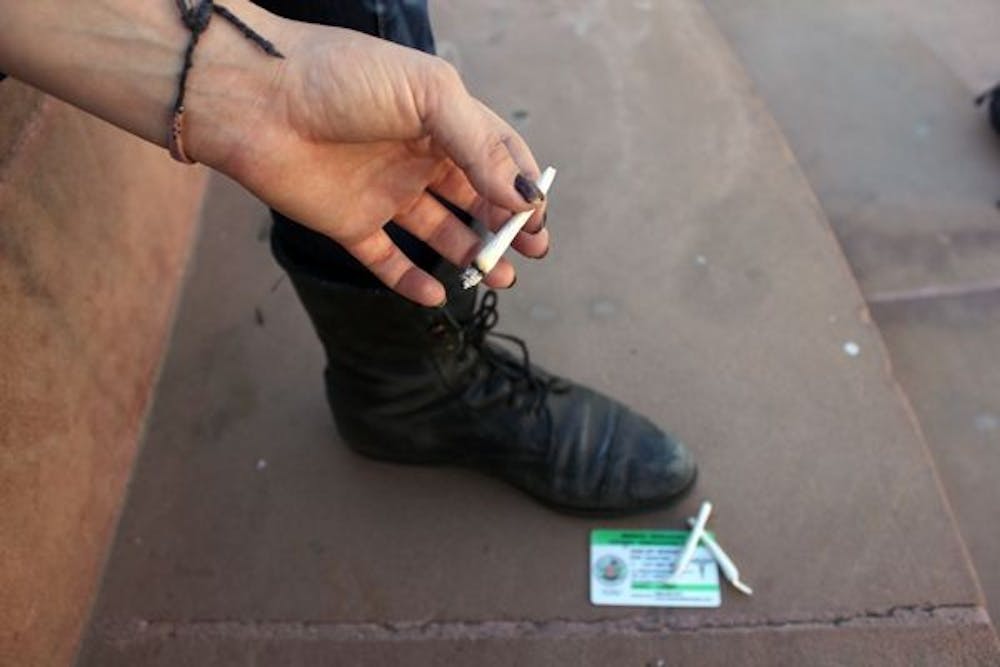A recent court decision could mean that Arizona will join the ranks of Colorado and Washington as a recreational marijuana state, so long as Arizona residents and ASU students vote in favor of it come Nov. 8.
‘Proposition 205: Regulate Marijuana Like Alcohol in Arizona’ is an initiative calling for legal recreational use of the drug by adults 21 years and older. If passed, it would allow a limited amount of marijuana to be grown in homes and licensed facilities.
According to a legal challenge from Arizonans For Responsible Drug Policy, Prop. 205's summary is not thorough enough to fully gauge how many people or preexisting laws will be affected by the proposal's terms.
Members of the organization said the proposal’s summary was "misleading" and “created a substantial danger of fraud, confusion and unfairness.”
Maricopa County Superior Court Judge Jo Lynn Gentry dismissed opposing arguments on Aug. 19. She said Prop. 205 cannot be disputed because with more than enough signatures on the petition, the initiative does not violate election code and cannot be barred from the ballot.
Although the initiative's only challenge has been struck down, its opponents have vowed to appeal to a higher court.
However, ASU Young Democrats President Austin Marshall said he believes it’s necessary for states to have a choice in the matter and that most members of Young Democrats generally support the initiative, although the club has not taken a general vote to formally endorse it.
"It’s almost been a consensus, and I can’t think of a member who is in opposition to the proposal,” he said.
Marshall said the Democratic Party could bolster the chances of the initiative’s approval.
“The growth is with Democrats,” he said. “I think the trends are changing so that this initiative has a very, very likely chance of passing.”
Although the Democratic National Committee announced its push for a “reasoned pathway toward future marijuana legalization,” Congressman Ruben Gallego has been the only Arizona Democrat to publicly endorse Prop. 205 so far.
Gallego's office did not respond to request for comment at the time of publication.
However, Marshall said the lack of public endorsement from Arizona’s Democratic representatives for Prop. 205 is the result of things falling between the cracks in a busy election season, not out of reluctance.
“It’s an interesting election year, an unusual one, and I think candidates are focused on the issues they care about,” he said. “We’ll give it time and see if anyone else comes out in support of it.”
The initiative states that tax revenue from consumption of the drug would go toward funding education and health departments.
In support of the proposition's potential economic effects, Marshall said he believes regulated, taxed marijuana would create jobs and spur a whole new industry.
“The tax revenue the state so desperately needs is going into education and health services, and that just compounds the benefits of the initiative even further,” he said.
Secondary education senior John Sullivan, who is a member of College Republicans at ASU, said he shares the same sentiment. He said the initiative has a likely chance of staying on the ballot.
“I think this is a matter that transcends the partisanship of progressives or conservatives,” he said. “The state is seeing a massive shakeup of certain long-held conservative, liberal or independent concepts.”
Sullivan said approval of the policy could possibly lift the social stigma regarding marijuana while potentially curbing cases of harder drug use.
Former Phoenix Police Department Sgt. Paul Penzone — a Democratic challenger to Sheriff Joe Arpaio — voiced opposition to the proposed legislation, despite simultaneously approving of the court decision.
“I just err on the side of being conservative as it relates to that,” he said. “When it comes to the roadways, when it comes to doctors or professionals who may be impaired, that gives me cause for concern.”
While Penzone may be opposed to the proposal, he said he feels his role is to enforce the law regardless of what it may be.
That is not the case for Arizona GOP Chairman Robert Graham, who said he is prepared to do what he can to stop the initiative from passing.
Graham said the proposal’s benefits, such as increased funds toward education and health services, are “a drop in the bucket” compared to the increase of crimes and rehabilitation that could result from its approval.
“I actually am vehemently against it," Graham said. “The reality is, I think it has such a huge negative impact on our state. ... Chairmen typically don’t weigh in on policy, but this one particular policy is something that I feel so strongly about that I’m getting behind the movement to stop Prop. 205.”
Reach the reporter at angel.n.mendoza@asu.edu or follow @angelnikolas96 on Twitter.
Like The State Press on Facebook and follow @statepress on Twitter.




